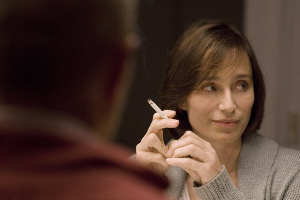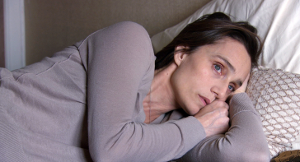I’ve Loved You For So Long (Il y a longtemps que je t’aime, Dir. Philippe Claudel, 2008):
With her porcelain looks and tensed-up, acrid delivery, Kristin Scott Thomas is a stealth missile when deployed correctly. Take Four Weddings and a Funeral, a supposed romantic comedy, in which Thomas renders the romance between Hugh Grant and Andie McDowell (and thus the film’s reason for being) irrelevant with the simplest of gestures: the lighting of a cigarette, a brittle declaration of love, an averting of the eyes. Too often, though, she’s been reduced to an object of desire, as in Prince’s Under a Cherry Moon or Anthony Minghella’s The English Patient. Befitting someone who spends much of her time in France (and French cinema), she’s too jaded to convince as someone who gets swept up in the throes of passion.
 Fortunately, I’ve Loved You For So Long, a French production and a confident rookie film by Philippe Claudel, is right in her wheelhouse, so to speak. When we first see Juliette (Thomas), she is newly released from prison, pale and sans makeup, cigarette glued to her fingers, fresh out of prospects or even a flicker of life, as far from an English rose as you can get — more like a thistle. She is taken in by her younger sister Lea (Elsa Zylberstein), who has a few issues of her own, including a not-so-understanding husband (Serge Hazanavicius) and an upbringing by parents who insisted that Juliette never existed. As Juliette struggles to reacclimate herself to the pace of society, we are immersed in her daily comings and goings: her strange camaraderie with her parole officer (a sad-sack Frederic Pierrot), her fumbling attempts to land a job, the looks on the faces of people who discover the reason she was in prison, the romantic attentions of a local professor (Lauren Grevill). What intrigues about this set-up is not necessarily the destination but the journey, as we’re acutely aware that any event may be the one that results in Juliette shutting herself off from human connection entirely.
Fortunately, I’ve Loved You For So Long, a French production and a confident rookie film by Philippe Claudel, is right in her wheelhouse, so to speak. When we first see Juliette (Thomas), she is newly released from prison, pale and sans makeup, cigarette glued to her fingers, fresh out of prospects or even a flicker of life, as far from an English rose as you can get — more like a thistle. She is taken in by her younger sister Lea (Elsa Zylberstein), who has a few issues of her own, including a not-so-understanding husband (Serge Hazanavicius) and an upbringing by parents who insisted that Juliette never existed. As Juliette struggles to reacclimate herself to the pace of society, we are immersed in her daily comings and goings: her strange camaraderie with her parole officer (a sad-sack Frederic Pierrot), her fumbling attempts to land a job, the looks on the faces of people who discover the reason she was in prison, the romantic attentions of a local professor (Lauren Grevill). What intrigues about this set-up is not necessarily the destination but the journey, as we’re acutely aware that any event may be the one that results in Juliette shutting herself off from human connection entirely.
Claudel’s script (like Lea, he is an English professor at Lyon) plays its cards strategically — we learn about Juliette’s past and the traumatic event that led her to murder bit by bit. Like a good literate novel, the film takes its time: we have repeated visits to the local swimming pool or a cafe, and each time we observe that Juliette has taken a tentative step or two forward. Moments that would be played as dramatic or “life-affirming” in a Hollywood production, as when Juliette has her first roll in the hay in over a decade, are dispensed with a wry, tossed-off looseness. As relaxed as Claudel’s cinematic style is, the film’s structure may be too tidy: characters wander in and out as needed (and to emphasize or contrast with Juliette’s isolation), and by the time we hit the conclusion, in which Juliette and Lea share a cathartic cry, one might think of the story as a 12-step program to grief counseling.
 Whatever one can say about any shortcomings of the film, Thomas rises above it all. Inevitably, as the story progresses she regains the glamour she’s famous for, but nothing in her performance takes the easy way out. Neither trolling for our sympathy nor stubbornly shutting out any sign of feeling, she dominates the proceedings, her silent, distracted gaze more terse and eloquent than any other element in the production. I’ve Loved You For So Long ends with a declaration by Juliette that serves as a neat little moment of hope, and yet we become rapt with uncertainty as the camera lingers on Thomas’s bemused face — salvation may be around the corner, but it’s not a lifetime guarantee.
Whatever one can say about any shortcomings of the film, Thomas rises above it all. Inevitably, as the story progresses she regains the glamour she’s famous for, but nothing in her performance takes the easy way out. Neither trolling for our sympathy nor stubbornly shutting out any sign of feeling, she dominates the proceedings, her silent, distracted gaze more terse and eloquent than any other element in the production. I’ve Loved You For So Long ends with a declaration by Juliette that serves as a neat little moment of hope, and yet we become rapt with uncertainty as the camera lingers on Thomas’s bemused face — salvation may be around the corner, but it’s not a lifetime guarantee.

